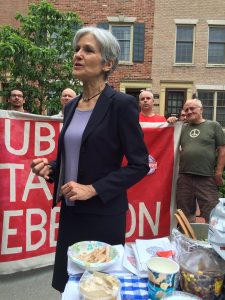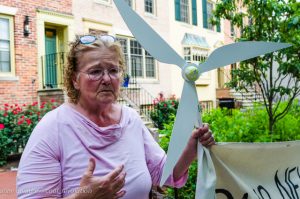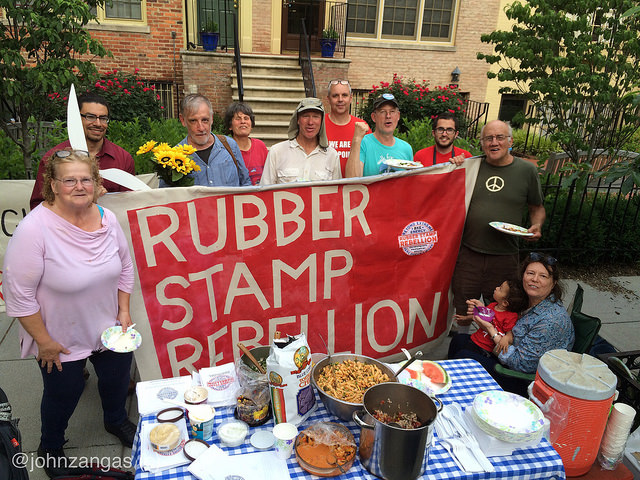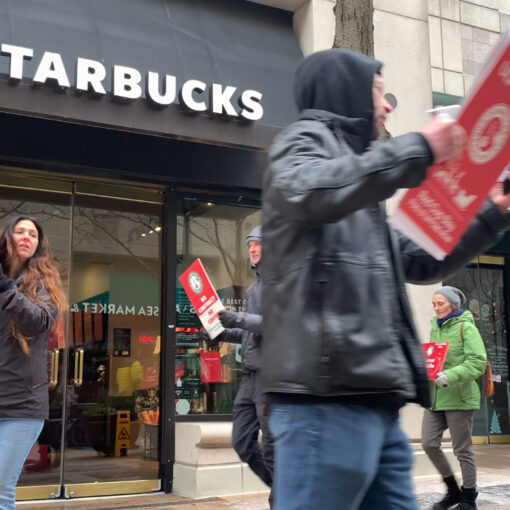An environmental group fired back at a Republican Senator who singled them out at a committee hearing on Tuesday for employing tactics which he insinuated were on par with terrorism. The organization, Beyond Extreme Energy (BXE), in turn accused Sen. John Barrasso (R-WY) of “McCarthyite, fear-mongering tactics” when he targeted them during a Senate hearing related to oil and gas pipeline permitting. While the Republican national security hawk painted BXE as extremists, Jill Stein, presidential candidate for the Green Party, instead came out in its defense.
During a hearing of the Senate Energy and Natural Resources Committee, Sen. Barrasso lambasted BXE for “engaging” the Federal Energy Regulatory Commission (FERC) with “highly questionably tactics.” He objected to BXE’s hand-delivering mail to the houses of FERC officials and posting their home addresses online. BXE is a group which routinely criticizes FERC for approving gas pipeline infrastructure and ignoring how the agency’s decisions affect landowners, the environment and the necessity to transition to renewable energy sources.
BXE has disrupted the agency’s monthly public meetings, blockaded its Washington, DC headquarters and even held an 18-day fast there. In February, they decided on a strategy to “escalate” by visiting the homes of the four FERC commissioners because they believed the agency was “non-responsive,” according to BXE member Ted Glick. Their actions have included delivering Valentine’s Day cards to their doors, leafleting neighbors, serving food, posting flyers with photos of the Commissioners, and serving mock eminent domain notices.

Largely due to BXE’s decision to protest at commissioners’ homes, FERC barred the public from attending its monthly public meeting in May. BXE complained that members of the gas industry were still invited to the meeting.
Sen. Barrasso quoted a BXE press release from May saying that the group would “target” FERC commissioners at their homes and “hold them accountable for their decisions.”
“I find these tactics in today’s world to be troubling, very dangerous,” he said.
He also demanded that Jonathan Perress, air policy director at Environmental Defense Fund (EDF), “denounce” BXE’s tactics on behalf of all environmental organizations. “Is [the environmental community] waiting for a public official, a FERC-confirmed individual or his family or her family and they get hurt, is that the plan?” Sen. Barrasso asked.
“It’s highly unfortunate,” Perress said, clearly taken aback.
Sen. Barrasso made a tenuous connection between BXE and EDF, pointing out that they were co-signing organizations of a letter last fall. But BXE member Steve Norris said that the group “hasn’t worked with the Environmental Defense Fund in any close way that I know of.”
“Our objective is not to make them afraid,” Norris added with respect to BXE’s visits to commissioners’ homes. “Our objective is to get them to wake up to the fact that things are going on in this country that FERC is permitting, that industry is pushing really hard.”
In a press release, BXE said Sen. Barrasso posed a threat to constitutionally protected speech, and the group maintained “a strict policy of nonviolence.”
Potlucks and Pipelines

Undaunted, BXE returned to FERC Chairman Norman Bay’s residence near DuPoint Circle on Wednesday evening to serve food to passersby and offer them leaflets outlining reasons why they believe FERC is a “broken agency” serving the interests of the gas industry. This time, they were joined by Green Party presidential candidate Jill Stein.
Stein had shown up unannounced to the event unaware of Sen. Barrasso’s remarks at the hearing. She emphasized however that action was necessary in light of the “all-out emergency” of climate change.
“Truth to tell, I would rather not have to do this. But on the other hand, we’re looking at not just disruption of our lives, we’re looking at the actual end of civilization as we know it,” she said. “And if we don’t mobilize right now, we’re in trouble.”
She pointed to an “Oh-my-God report” on glacier melting which predicts as much as nine feet of sea level rise by 2050, potentially rendering coastal cities uninhabitable.
Natural gas is composed primarily of methane, a greenhouse gas 86 times more potent than carbon dioxide over a 20-year period. The severity of methane leaks from pipelines, storage and wells has been greatly underestimated.
Nibbling on watermelon, Stein disagreed with Sen. Barrasso that their presence at Chairman Norman Bay’s home was in any way sinister. “We are not here picketing, we are not here threatening people. We are here offering people food and congenial conversation,” she said. “So this is not like a Donald Trump event. We are not coming out with our fists and God know what else and our violent mentality. We’re really here to talk to people, to engage one-on-one as human beings… Our corporate, corrupt political parties are not going to do this for us. We need to do it ourselves.”
Sen. Barrasso has received contributions to his campaign committee and leadership PAC over the past five years totaling $560,466 from the oil and gas industry and $287,456 from the mining industry, according to the Center for Responsive Politics.
Asked about BXE’s planned event at its Chairman’s home, a FERC spokesperson declined to comment.
Gas Refugee

FERC’s ability to grant gas companies powers of eminent domain to build or expand pipelines has angered many “ordinary” people around the country and driven them to adopt strategies of protest they might never have contemplated before.
Maggie Henry, who alternately served up food and held one end of a banner in front of Chairman Bay’s residence, describes herself as a “gas refugee.” She had an organic farm near the Ohio-Pennsylvania border surrounded by fracking wells. A 40-inch diameter pipeline ran only 30 feet from the door of her house. Her farmhouse regularly shook from earthquakes which she said ruined the integrity of the basement foundation. (Fracking and fracking waste wells can cause earthquakes.) She feared the pipeline would explode.
“Fracking has destroyed my life. When you steal from me the right to raise my grandchildren on the land that their parents worked on… I’ve been radicalized,” she said. “I don’t have a violent bone in my body, so I’m a danger to no one. But there’s nothing I won’t do.” She blamed gas companies and FERC officials who “permit everything.”
“They’ve stolen everything from me. They’ve destroyed everything we worked our entire adult lives for,” Henry continued. “We borrowed half a million dollars and sunk it into this farm and spent the next 20 years slaving to pay that off. And it’s gone, it’s just gone.”
Escalating Tactics
Nonviolent protesters and those objecting to pipelines being built on their land may be escalating tactics, but what is often overlooked is that police are escalating too.
Henry described rough treatment by police when she was arrested protesting at the inauguration of Pennsylvania Governor Tom Wolf in January 2015. She was also present when U.S. marshals showed up with AR-15 semi-automatic assault rifles to escort tree cutters onto a maple syrup farm in Pennsylvania in March. Williams Partners LP had gotten permission from FERC to clear a path for the Constitution Pipeline in Pennsylvania, although it still had not obtained a necessary permit in New York. Only days after the trees were cut down on the farm, Williams Partners announced that construction of the Constitution Pipeline would be delayed several months. Later, New York’s Department of Environmental Quality denied the permit, leaving the fate of the Constitution Pipeline in limbo.
There have been other disturbing developments, such as the revelation that a gas company paid a local Pennsylvania police department to deter protests and prevent costly delays to a pipeline upgrade.
Revolt
FERC seems confident that it is providing ample opportunity for public participation in decisions on pipelines, compressor stations, storage and LNG terminals. It is however facing an unprecedented revolt. Earlier this week, for example, a public meeting on the expansion of the Atlantic Sunrise Pipeline in Lancaster, Pa., descended into chaos, and FERC representatives were driven from the room.
On Thursday, three people from BXE disrupted the FERC commissioner’s monthly public meeting as usual. Following that, about a dozen people affiliated with BXE visited Sen. Barrasso’s office and met with an aide.





